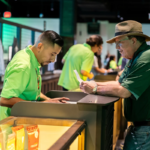VALLEY CENTER, Calif—California Indian tribes have announced a newly formed group to protect “the sovereign right of Native Americans to operate cannabis on their lands.” The California Native American Cannabis Association, or C-NACA, is based in Valley Center, California.
“Just like gaming, it’s our sovereign right to get into this industry without compromising our rights,” said Blue Quisquis, President of Emerald Enterprise and Sapphire MJ Solutions. “We organized C-NACA to build tribal support and to educate our fellow tribes about all aspects of the industry.”
The group has announced its first opportunity to meet with tribes on September 20, in Sacramento. The meetings will take place at 1225 8th Street, Suite 420 (pun intended), between 1:30-3:30pm PDT.
The group also will host an educational symposium, to be held Oct. 29-Nov. 1, at Morongo Casino Resort, located in Cabazon, California.
The group also has approached Governor Jerry Brown to begin consultation with the state government to insure tribes’ rights to self-regulate and sovereignty are specifically preserved in the language of regulatory legislation being developed for the California cannabis industry.
“Like gaming, tribes are very capable of developing and regulating tribal cannabis operation through self-regulation to ensure the licensing of products is safe for all consumers. We can set standards to protect the public health and safety of our Community. We’re asking all California tribes to support the sovereign rights of those tribes getting into the cannabis business,” Quisquis added, in a post on Indian Country Today.
With longtime experience in gaming, Quisquis said that education for tribal members is C-NACA’s highest priority right now, so that Indian-owned cannabis businesses achieve high standards and compliance with regulations.
“We found that lack of education is part of the challenge for tribes considering cannabis,” he explained. “For years, the public was told cannabis was a gateway drug that was bad for you and had no medicinal value. But now there’s an abundance of scientific knowledge, and it’s being used worldwide to treat cancer patients, seizures in babies, elders and veterans who are addicted to opioids, and many diseases. The U.S. government even has a Patent No. 6,630,507 for cannabinoids found to have antioxidant properties.”
“I am very passionate about cannabis,” he said further. “I have seen and helped my sister go from stage three breast cancer to being cancer-free with cannabis.”
California currently recognizes one hundred and nine Indian tribal communities in California, who operate “nearly one hundred” reservations or “Rancherias” across the state.
“Tribes should be allowed to get into this industry without giving up sovereignty or jurisdiction to govern our land and people. We should not be subjected to the business licensing structure that the state is putting in place because we are self-governing nations and should be treated as nations. It’s very important for tribes to have strong regulatory bodies to show transparency and demonstrate that we are able to not only meet but also exceed California’s regulations in some areas,” said Utu Utu Gwaitu Paiute Chairwoman and C-NACA member Tina Braithwaite.
A letter to Braithwaite from Tribal Advisor to Governor Brown Cynthia Gomez said, “… The State of California is open to the participation of trial governments in California’s cannabis marketplace. The various bureaus and agencies that are developing the regulatory framework that will govern that marketplace have conducted numerous outreach meetings, developed and distributed draft regulations, invited comments on those regulations, and are working hard to promulgate regulations that will create a fair, effective, and vibrant commercial marketplace and ensure protection of California consumers. During our meetings, we encouraged you to participate in that process as the most effective way to ensure that the interest of tribal governments are considered.”
C-NACA representatives were unavailable for comment at the time of this post.
For more information on C-NACA events, contact (760) 638-0601, or email [email protected], or visit the C-NACA website.












